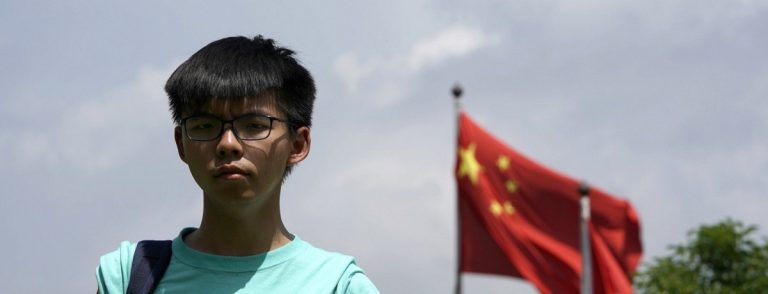
When Hong Kong judge Wally Yeung read the judgment sentencing pro-democracy activists Joshua Wong, Nathan Law and Alex Chow to jail last week for unlawful assembly, the point was clear: To deter anyone thinking of following their footsteps.
“Such arrogant and self-righteous thinking [has] unfortunately affected some young people, and led them to damage public order and peace during protests,” Yeung said, according to the Hong Kong broadcaster RTHK.
If this “sick trend” does not stop, Yeung warned the courts may hand down even more severe sentences in the future.
But how sound is this move? Can jail or the threat of it, quell the country’s thirst for the greater freedoms they were promised?
Unfortunately for Beijing, the answer seems to be a “no”.
While the sentence will curtail speech and create a climate of fear, analysts are confident this is not the end of the road for Wong, his fellow activists or the tens of thousands who took to the streets three years ago in a 79-day protest calling for greater democracy.
Known as the Umbrella Movement, it first began as a weeklong boycott by Hong Kong’s students against a ruling that candidates standing for the role of Hong Kong’s leader in 2017 would have to be screened by Beijing first. The students saw this as an attempt to engineer the city-state’s democratic elections, despite the wide-ranging autonomy guaranteed to Hong Kong under the “one country, two systems” formula after the former British colony was handed over to China 20 years ago.
And in a move unprecedented for a state known more for its financial district than for its political uprisings, the boycott later ballooned into a months-long protest that drew hundreds of thousands of supporters at its peak, paralysing the usually busy city streets.

The battle for universal suffrage. Source: Shutterstock
Such an event will not be taking place again anytime soon given last week’s ruling, according to Brian Christopher Jones, a Professor of Law at the University of Dundee, a prediction echoed by Wong’s lawyer. But while it may dissuade dissenters for a while, Jones thinks the harsh sentence will potentially legitimise the jailed activists’ platforms and their followers even further.
“In the long-term, this looks like some sort of desperate move by the Hong Kong government which could easily backfire, and may even embolden Hong Kong’s citizens for future movements,” Jones wrote in an email to Asian Correspondent.
While the jailing looks to be the climax of the Hong Kong government’s sustained efforts to cripple political activism (many pro-democracy lawmakers were also disqualified from office in recent months for their “insincere” swearing-in oaths), Khoo Ying Hooi, a senior lecturer at the Department of International and Strategic Studies at the University of Malaya argues otherwise.
Khoo said:
“History has shown very often in democracy struggles, trigger points like this (jailing of dissidents for example) are significant.”
Like the Arab Spring and the Gwangju Uprising – where hundreds of South Koreans died in an uprising against military dictator Chun Doo-hwan in the 80s – disproportionate state action on a small number of people have the power to escalate protests even further.
Persistence is key in social movements, Khoo said.

Golden Bauhinia Square, a symbol of the city’s handover to Chinese rule. Source: Shutterstock
But with their “youthful face of protest” behind bars, coupled with a tired movement marred by bitter infighting among opposition groups, can the resistance really sustain itself or even escalate?
Victoria Hui, an Associate Professor at the University of Notre Dame’s Department of Political Science, wrote in a blog post last month Hong Kong’s citizens are now in the “demobilisation” stage.
During the Umbrella Movement, protestors were mobilised by the successful cases of mass protests in 2003 and 2012. The perceived failure of the 2014 movement demobilised them, making them see any form of resistance a “seemingly lost cause”.
But the size of Sunday’s turnout, where thousands marched for the release of the political prisoners in the “biggest protest since Occupy”, may give hope to those dejected, Hui said in an email to Asian Correspondent.
“Look at how other members of Demosisto are stepping up. And the size of the protest on Sunday. I was there and so moved.”
They can silence protests, remove us from the legislature and lock us up. But they will not win the hearts and minds of Hongkongers.
— Joshua Wong 黃之鋒 😷 (@joshuawongcf) August 17, 2017
Hui echoes Wong’s parting call to Hong Kongers as he left the courtroom last Thursday to not give up.
Among others, she said the average person could turn to other common forms of resistance such as boycotting pro-Beijing businesses and donating to disqualified legislators.
“Do whatever one can think of to live in truth and to sustain Hong Kong’s core values,” she said.
**This article first appeared on our sister site Asian Correspondent
Liked this? Then you’ll love these…
Hong Kong: Student protest leader Joshua Wong ‘mentally prepared’ for jail







